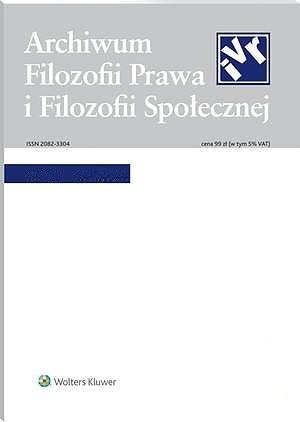O strukturze intuicji normatywnych: uniwersalna gramatyka moralna
On the structure of normative intuitions: universal moral grammar
Author(s): Maciej PróchnickiSubject(s): Law, Constitution, Jurisprudence, Philosophy of Language, Philosophy of Law, Philosophy of Law
Published by: Stowarzyszenie Filozofii Prawa i Filozofii Społecznej – Sekcja Polska IVR
Keywords: ethics; legal philosophy; generative linguistics; moral psychology; philosophy of mind; cognitive science; Noam Chomsky
Summary/Abstract: The aim of the article is to critically characterize the new, interdisciplinary research program on morality: universal moral grammar, and to describe its meaning for jurisprudence. Its proponents, such as John Mikhail and Marc Hauser, refer to John Rawls’ linguistic analogy, i.e. comparison of morality to language and suggestion to study it similarly to Noam Chomsky’s generative linguistics paradigm. According to moral grammarians morality, like language, settles on innate, universal cognitive capacities, common to all people. Some evidence supporting these claim, come from various scientific disciplines, such as developmental psychology, neuroscience, anthropology or logic, but they are criticised as weak and inconclusive. The article tries to assess to what extent the linguistic analogy is accurate and useful, analyzing some of the most important N. Chomsky’s claims and their adaptations to the systems of social norms, such as morality and law. The first argument is so called poverty of the stimulus, assuming that the classic learning mechanisms cannot explain the phenomenon of acquisition of language and morals. Other elements of N. Chomsky’s theories adapted to analyze morality include characterizing morality as a system of principles and parameters, divisions between I-morality/E-morality and competence/performance, and also an assumption that the specialized mental module for it exists. Research conducted in universal moral grammar program may have substantial influence on jurisprudence. Firstly, assumptions made by moral grammarians can be seen as a construction of a modern, naturalized theory of natural law, based on empirical study. Moreover, the goal of the program is to fully describe concepts such as guilt, act, obligation or damage, and as an effect to schematize it as an advanced deontic logic, and also to discover sources of intuitions regarding them not only through research on their biopsychological foundations, but also through legal anthropology and comparative legal studies.
Journal: Archiwum Filozofii Prawa i Filozofii Społecznej
- Issue Year: 14/2017
- Issue No: 1
- Page Range: 102-114
- Page Count: 13
- Language: Polish

